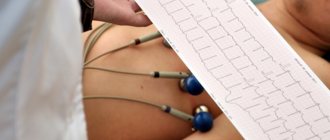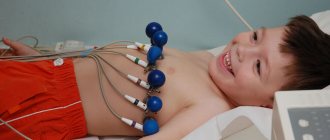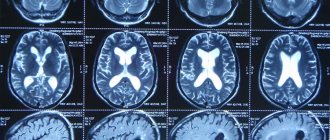Why does coughing cause pain in the heart area?
Causes of heart pain when coughing:
- Coronary heart disease - the characteristic pain of an attack of coronary artery disease, called angina, occurs when blood flow to part of the heart muscle stops. The lumen of the coronary vessel is blocked by an atherosclerotic plaque or spasm, the myocardium does not receive enough oxygen and glucose, resulting in ischemia - the cause of pain.
This phenomenon is reversible and goes away on its own or after rest and taking Nitroglycerin, but is sometimes complicated by a heart attack;
- myocardial infarction - cough becomes a trigger factor for the disease, especially in patients suffering from unstable angina, aggravated by atherosclerosis. During an attack, intense pain occurs that radiates to the left arm, shoulder blade, neck, and lower jaw. This condition requires emergency medical attention and restoration of blood flow, thrombolysis or revascularization;
- myocarditis is an inflammation of the heart muscle, which is caused by both infectious agents and one’s own immune cells during an autoimmune process. In addition to chest pain when coughing, myocarditis is sometimes accompanied by cardiac arrhythmias, fever, weakness and shortness of breath;
- pericarditis - any sudden movement of air through the respiratory tract is accompanied by a feeling of acute aching pain in the front of the chest. Normally, there is a small amount of fluid between the epicardium and pericardium, which allows the organ to glide during contraction. Inflammation makes the inner surface of the heart sac dry and rough, and this causes pain in the patient. The condition forces a person to assume specific positions in which the pressure in the chest cavity is minimal in order to obtain relief;
- hypertrophic cardiomyopathy is a genetic disease in which the heart muscle abnormally increases in size. Characteristic symptoms are weakness, attacks of tachycardia and frequent fainting. The cough in such patients causes discomfort due to its persistence and dryness. The cause is pulmonary hypertension syndrome (increased pressure in the pulmonary circulation, in particular in the pulmonary arteries). Such a patient exhibits signs of congestion in the lower parts of the lungs;
- Mitral valve prolapse is a malfunction of the valve between the left ventricle and the left atrium, in which one of the leaflets does not close during systole. As a result, part of the oxygenated blood returns to the left atrium. In people with this anomaly, physical activity, including coughing, causes pain in the heart area, palpitations, dizziness and fainting;
- dissecting aortic aneurysm - a life-threatening condition that occurs when there is a defect in the vascular wall, which results in the formation of a “bruise” inside. The aorta is the largest vessel in the human body with the highest blood pressure, as a result of which a small tear quickly increases in size, leading to massive blood loss and death.
Risk factors are high uncontrolled arterial hypertension and atherosclerosis. Other causes include chest injuries, genetic diseases, and involvement of the esophagus in the cancer process.
- heart failure - coughing with pain in the heart is a sign of worsening heart failure. Depending on the degree of the disease, it can be either dry or wet with foamy pink sputum. Obvious signs of decompensation are generalized edema and accumulation of fluid in the abdominal cavity.
What hurts when you cough?
The pain syndrome caused by coughing attacks can be defined by different levels of intensity and the nature of the pain: sharp or dull, localized or widespread, severe or moderate.
The location where the pain is detected may indicate the affected organ: in the throat, sternum, inside the chest, under the ribs or in the back, stomach, head. Very often, patients describe their sensations as pain in the lungs, but it is worth clarifying that there are no pain nerve endings in the lungs themselves. Cough, accompanied by pain, is a consequence of diseases of a very different nature.
What to do
Pain in the heart area when coughing should attract the attention of both patients with already diagnosed diseases and healthy people.
If your heart suddenly hurts when you cough, take a semi-sitting position and provide access to fresh air. Take a Nitroglycerin tablet under your tongue. If the pain does not improve, repeat the dose after five minutes and call emergency medical help. The faster you respond to the alarm bell given by your body, the higher the chance of a favorable outcome for life and health.
When you notice pain for a while (this is not an acute process), consult a general practitioner. With the help of simple and accessible studies: electrocardiogram, chest x-ray, physical examination (listening to heart and respiratory sounds, percussion of the heart and lungs) many pathologies are diagnosed in the early stages.
If you smoke and notice a cough that is aggravated by chest pain, consult a doctor and try to get rid of the bad habit. To learn how smoking affects your heart function and blood pressure, watch the video at the link below.
Treatment of painful cough
We remind you that in order to prepare competent treatment, you need to contact a general practitioner, who will refer you to a specialist (otolaryngologist, phthisiatrician, cardiologist, neurologist, etc.) for a full examination. Selecting your own medications and abusing painkillers can be dangerous to your health and lead to complications.
- If the pain is of an infectious-inflammatory nature, antibacterial, antiviral therapy, or treatment with other drugs may be prescribed, depending on the causative agent of the infection and the location.
- For the symptomatic treatment of cough, drugs are first prescribed that promote sputum separation and convert a dry cough into a productive one.
- In rare cases, medications may be prescribed to suppress coughing attacks, but this may slow down the healing process.
- If the cause of pain is identified as pleurisy or pericarditis, then a puncture of the pulmonary or cardiac membrane is prescribed to relieve the corresponding organs.
- For GERD, antacids and medications that help reduce the acidity of gastric juice may be prescribed.
- Pinched nerve endings localized in the sternum area can be relieved with painkillers and sedatives.
Diagnosis and treatment
There are different ways to examine the lungs and adjacent respiratory structures. The most commonly used method is radiographic examination. But in case of severe disease and insufficient data from traditional diagnostic methods, it will be necessary to undergo a targeted tomographic scan using a computer or magnetic resonance imaging unit. Any inflammatory process, abnormal neoplasms at the earliest stages, the extent of the spread of pathology are clearly visible on tomograph images, which helps to establish the most correct diagnosis. Treatment consists of taking antiviral drugs or targeted antibiotics.
You can undergo an MRI examination or in St. Petersburg at any medical center that has the necessary equipment. All diagnostic institutions registered in the city are included in a single list of recording services. Go to the portal, select the desired procedure and make an appointment directly through the website. The centers are located in a differentiated list, which makes it easy to compare prices and ratings, get acquainted with general information and choose a convenient location address. All service users receive special discounts on the selected type of procedure.
Diseases of the musculoskeletal system
Often, even during a mild cough that is not caused by the presence of pulmonary diseases, a person still experiences back pain. This is one of the main symptoms that the patient has problems with elements of the musculoskeletal system.
Most often, pain during coughing is observed in the presence of traumatic injuries. A person complains of pain in the lower back or shoulder blades. It can be provoked by bruises, fractures, and cracks in bone tissue.
Fractured ribs
Attention! On the second day after injury, a person may feel signs of developing pneumonia, since in more than half of all cases of chest injury, damage to the lungs or pleura occurs.
Also, the cause of back pain during coughing can be a disease such as myositis. This is an inflammatory process that occurs in muscle tissue. Its main reasons:
- hypothermia;
- metabolic problems;
- muscle overtraining;
- stress.
Myositis of the neck
The pain is usually felt more strongly when coughing or when taking a deep breath. However, the patient is also unable to move freely and has difficulty breathing.
Attention! If the cough is severe, then muscle pain can also easily develop, since during attempts to clear the lungs of irritating elements, most of all the muscles of the chest and back contract.
Myositis - muscle inflammation
Also, back pain when coughing can be associated with osteochondrosis, a degenerative disease localized in the spinal column. During the disease, both the vertebrae and intervertebral discs and the soft tissue surrounding the main support of the human body are affected. As a rule, in the presence of osteochondrosis, pain is always present, but when coughing it can intensify and become aggravated.
Prices for orthopedic corsets and posture correctors
Intercostal neuralgia
If you experience girdling pain during coughing, you can suspect intercostal neuralgia, a disease associated with the development of pathological processes occurring in the area of the nerve roots of the spinal cord. The pathology is also characterized by difficulty in movement and increased pain during attempts to change body position, with a deep breath.
Intercostal nerve
Intercostal neuralgia can be provoked by:
Possible diseases of the lungs and upper respiratory organs
Among the common “provocateurs” of acute or chronic cough syndrome are:
- ARVI/flu.
- Bronchitis.
- Pharyngitis/laryngitis.
- Whooping cough.
- Pneumonia/pleurisy.
The symptoms of these diseases are similar and require differentiation during diagnosis. The main signs are a severe dry cough, which over time can become “wet” with copious discharge of purulent substrate. An elevated temperature develops, the head becomes hoarse, and wheezing is heard during breathing.
Increasing pain in the chest occurs with pleurisy and pneumonia. The cough becomes suffocating, even triggering a gag reflex. Only the attending specialist can determine the pathology based on tests and other instrumental diagnostic procedures.
Possible diseases and symptoms of pain in the solar plexus
One of the reasons may be neuritis, which causes inflammation of the nerve endings of the solar plexus. Neuritis can be caused by quite a variety of factors. It can occur due to heavy physical exertion, a sedentary lifestyle, injury, or due to surgical intervention. Neuritis can occur and manifest itself at any time of the day, but those who are nervous a lot or find themselves in stressful situations are especially susceptible.
During a change of position, the pain may intensify and expand the radius of pain, after which painful sensations may occur in the spine and sides. In order to dull the pain a little, you can bend over and press your knees to your chest, this may help somewhat. To completely eliminate pain, you need to identify the cause of the pain and eliminate it, it could be a virus or pathogens.
The solar plexus is a plexus of nerve endings
Neuralgia is in many ways similar to neuritis, but the pain is much stronger. You may feel as if your solar plexus is being squeezed in a vice. This disease occurs due to irritation of the nerve ganglion. Sometimes the pain is so severe that it is difficult to breathe air and move. The causes may include pathologies and disorders of the nervous system, parasitic microorganisms, and viruses. Treatment involves pain relief.
Main reasons
In any case, coughing is a pathological process and requires identification of the true causes and treatment. And if it is accompanied by pain, then you should immediately go to the doctor, since this secondary symptom may signal the development of serious diseases. Moreover, it is not necessary that they will be localized in the lung area.
Cough can occur for various reasons
Back pain when coughing can be observed:
- if there are problems in the respiratory system;
- due to diseases of the cardiovascular system;
- due to pathologies in the digestive system;
- in the presence of pathologies of the urinary system;
- due to diseases of the musculoskeletal system;
- in the presence of damage to the nervous system.
On a note! Pain when coughing can occur even in smokers who do not have any pathologies as such, but only notice a smoker’s cough. The fact is that the lungs experience increased stress during cigarette consumption - hence the appearance of pain.
Back pain
Among the diseases, the most common causes of pain when coughing are:
- injuries;
- myositis;
- pneumonia;
- pleurisy;
- osteochondrosis;
- cancerous tumors.
Osteocondritis of the spine
Pregnancy, nervous tension and stress can also trigger discomfort. Expectant mothers most often complain of pain when coughing in the second half of pregnancy. True, in this case the woman will experience discomfort not at the level of the lungs, but rather in the lumbar region.
Bandages for pregnant women
Pain when coughing during pregnancy
What is a cough?
A cough or cough reflex is a special way of clearing the airways, which is triggered by the body's immune system. During a cough, sputum may be released, which allows the body to cleanse the cavity of the bronchus and trachea from foreign objects, dust, pathogens, etc. Also, due to coughing, dead epithelium or tissue damaged by inflammatory processes can be released.
Coughing clears the airways
On a note! There are different types of cough, and depending on what it is and what caused it, doctors will prescribe medications to help cope with it. You should not take such drugs uncontrollably. And it is important to remember that coughing is a natural cleansing process, and it is not always right to suppress it.
During a cough, air from the lungs comes out in a sharp gust through the person's mouth. Receptors of the respiratory tract are irritated due to certain factors acting on them, and cause the patient to cough. Most people consider a cough to be a disease, but in fact it is a symptom accompanying a disease, most often associated with the penetration of viruses and bacteria into the body.
Types of cough
When coughing, not only the lungs are involved, but also the muscles. The pressure inside the chest changes, and this process, in turn, affects some elements of the musculoskeletal system. In this case, movements in the joint area occur with minimal amplitude, and elements of the nervous system can be stretched.
Bromhexine for pain
Bromhexine is prescribed for the rapid removal of mucus from the respiratory tract in various diseases of the respiratory system: bronchitis, pneumonia, ARVI and influenza, asthma, pneumoconiosis. Bromhexine does not have an analgesic effect, it alleviates respiratory symptoms and helps get rid of an unproductive painful cough that can cause pain.
For other causes of cough (cardiac, gastric, neurological), the use of bromhexine and other mucolytics is ineffective.







